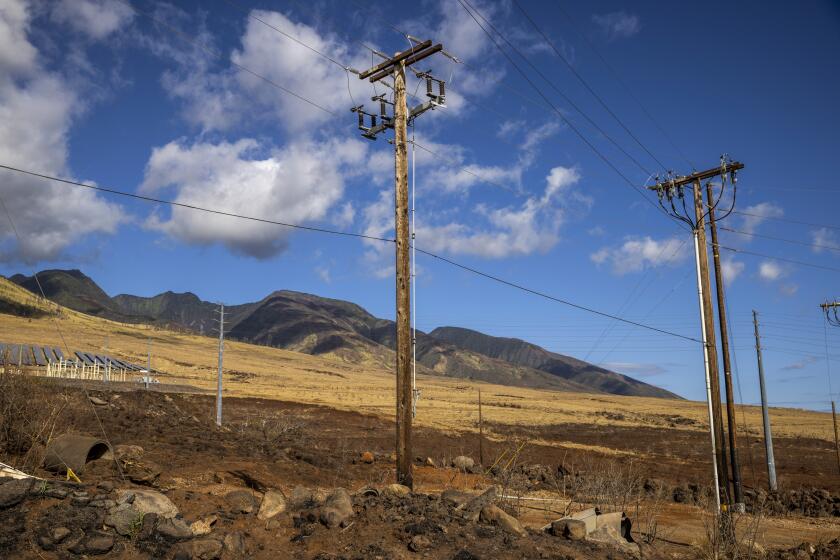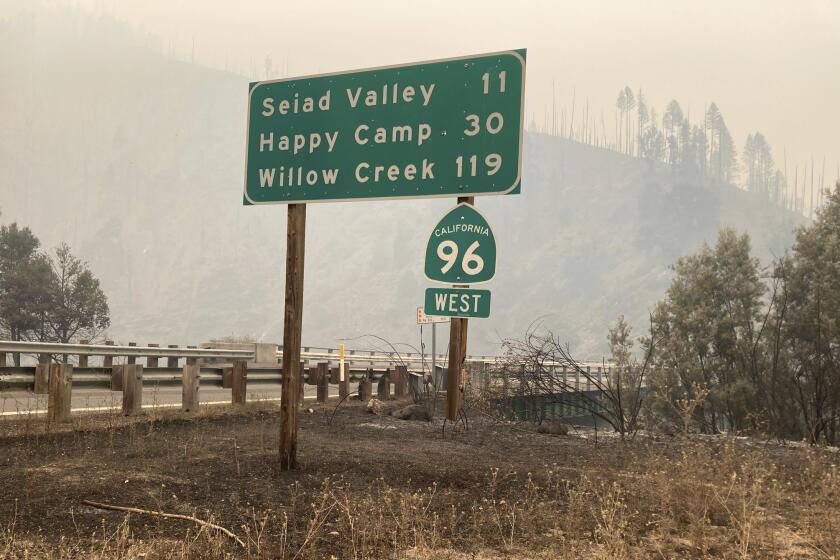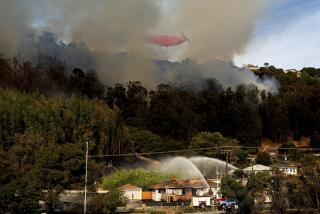With fire risk high, Northern California braces for power shutoffs amid smoky skies

Officials are warning that thousands across Northern California could lose power Wednesday in planned outages as the region faces a critical fire threat — while already dealing with poor air quality amid smoky skies and growing devastation from multiple ongoing wildfires.
Much of the Sacramento Valley and North Bay Area interior mountains are under a red flag warning from late Tuesday through Wednesday, with gusty winds and low humidity predicted, a combination that forecasters said could cause fire to “rapidly grow in size and intensity.” It is the first red flag warning — indicating the most critical fire conditions — issued this year by the National Weather Service office in Sacramento, and the first issued since 2021 in the Bay Area’s office.
The weather service urged residents to take precautions to prevent fires and have an emergency plan ready if a fire starts.
When high winds on Maui brought down power poles, the electrical wires were bare, uninsulated metal that could spark on contact with the dry grass below.
Pacific Gas & Electric Co., the state’s largest utility provider, warned that up to 8,000 customers across seven counties should prepare to lose power Wednesday in likely “public safety power shutoffs.”
“Given the wind event and current conditions, including dry vegetation, PG&E has begun sending advanced notifications to customers — via text, email and automated phone call — in targeted areas where PG&E may need to proactively turn power off for safety to reduce the risk of wildfire from energized powerlines,” the company said in a statement.
The planned outages could begin around 3 a.m. Wednesday, affecting residents mostly on the west side of the Sacramento Valley — where the National Weather Service said there would be the “highest threat” of fire conditions.
The majority of affected residents are in Shasta and Tehama counties, but pockets of Colusa, Glenn, Lake, Napa and Yolo counties could also see planned outages, according to PG&E. Utility officials said the shutoffs were meant to “stop catastrophic wildfires by proactively turning off power when extreme weather threatens our electric grid.”
It wasn’t immediately clear how long the shutoffs might last.
Already north and west of this region, multiple wildfires — mostly sparked by lightning strikes earlier this month — are burning in primarily remote areas, with heavy smoke spreading well beyond the blazes’ perimeters.
Cal Fire is the first fire agency to use artificial intelligence to look for signs of wildfires and directly alert dispatch centers.
The Bay Area Air Quality Management District again warned of poor air quality Tuesday as a result of growing smoke plumes drifting south from fires in Northern California and Oregon. Smoky skies have prompted air quality warnings almost every day in the last week.
The largest of the fires had burned 74,000 acres along the Oregon border in Six Rivers National Forest by Tuesday morning, with crews working urgently to secure a perimeter before conditions worsen early Wednesday. The Smith River Complex fire has prompted evacuations, closed much of the national forest and remained only 7% contained, according to the incident command team.
Farther south, but still primarily in the Six Rivers National Forest, federal officials are responding to a web of 20 wildfires burning across 11,000 acres, making up the Six Rivers National Forest Lightning Complex and Redwood Lightning Complex. The wildfire complex was 20% contained Tuesday morning, according to federal officials.
The Happy Camp Complex in the Klamath National Forest has scorched at least 11,616 acres and was 4% contained as of Wednesday morning.
The Happy Camp Complex fire, burning more than 22,000 acres in the Klamath National Forest, has already killed one person and destroyed nine structures, with 1,600 structures threatened. As of Tuesday, it was 31% contained, officials said.
Gov. Gavin Newsom declared a state of emergency in Del Norte and Siskiyou counties due to the Smith River Complex and Happy Camp Complex fires, respectively. The proclamation waives fees and licensing requirements for out-of-state contractors to help restore utility infrastructure. It also waives fees for official documents, such as marriage and birth certificates or driver’s licenses, that may have been lost in the fire.
Also 31% contained was the South Fork Complex fire, straddling the border of the Shasta-Trinity and Six Rivers national forests, mostly in Humboldt County. Both national forests have closed areas surrounding the fires, which in total make up 3,000 acres, officials said.
Times staff writer Jeremy Childs contributed to this report.
More to Read
Sign up for Essential California
The most important California stories and recommendations in your inbox every morning.
You may occasionally receive promotional content from the Los Angeles Times.














